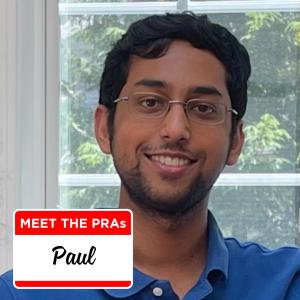Meet Paul Isaac ’23, an OUR Peer Research Ambassador (PRA) majoring in Molecular & Cell Biology and Diagnostic Genetic Sciences, and minoring in Bioinformatics.
 What is the focus of your research?
What is the focus of your research?
Horseshoe crab blood contains proteins that have high affinity to bacteria and fungi. For this reason, the pharmaceutical industry has been bleeding these crabs to create a sterility test used on most biomedical devices and drugs. My research is focused on sequencing and analyzing the genome of the North Atlantic Horseshoe crab (Limulus polyphemus) to study the genes behind these clotting proteins to eventually create a synthetic version of this sterility test and eliminate the need for bleeding practices.
Why did you get involved in research?
Ever since I was diagnosed as being color-blind at age 6, I’ve been curious about genetics and how genetic technology and theory is applied. In high school, my biology teacher taught us about genetic engineering through a basic transfection experiment that made a bacteria fluorescent. In the moment I thought, “if we could add a gene to make bacteria glow, what if we could add a gene that could “fix” disorders or help other organisms?”. I googled the concept and was bombarded by a slew of literature by researchers working towards that same goal. Wanting to pursue and contribute to that ideal at UConn is what led me to design my first formal research project and my PI’s amazing personality and mentorship have helped me turn those projects into a passion to not be a bystander to progress, but to actively contribute to it through research.
What advice would you give to aspiring student researchers?
Anticipate failures and learn to re-evaluate them. The best researchers aren’t people that get perfect results or get their assays to work every time. Instead, they design their experiments to make sure that they can still extract meaningful information from negative results and find ways to make sense out of unexpected data. You can choose to give up and just throw out a contaminated cell culture flask, or sequence it and maybe discover a novel pathogen within it.
What do you enjoy the most about participating in research?
My favorite part about doing research is how it’s allowed me to translate the information I learn in class into practical skills and techniques. As a result, it’s helped me become more enthusiastic about my classes and understand niche STEM topics on a deeper level than I used to. Although I initially thought that learning about mass spectrometry in organic chem was just useful for the MCAT, I was able to find a use for it in my research and appreciate just how powerful of a technique it is.
Describe the impact your research experience has had on you.
My research experience at UConn has given me the opportunity to collaborate with researchers from a variety of disciplines both from UConn and other institutions. Seeing and hearing how different people tackle questions and challenges has helped me approach school and life in a more open-minded manner. Moreover, my experience working researchers specializing in subjects like statistics, sociology, psychology, and ecology have helped me realize how deep the rabbit hole can go in any field of knowledge. Before doing research, I thought I was a curious person, but having the chance to talk in depth with people that have dedicated their lives to asking and answering questions has made me realize how many important questions exist that Google can’t yet answer.
What are your plans after graduation? How has involvement in research influenced your plans and prepared you for the future?
Coming into UConn, I had planned to pursue medicine and maybe become a family medicine doctor or cardiologist. However, my experience being part of a research team and exploring the boundaries of genetics research have made me realize that I want to continue doing it after college. As a result, I’m now hoping to join an MD/PhD program to research and implement genomic medicine for the treatment of cancer and inherited disease. My lab and the DGS major played a big role in helping me translate everything I’ve learned into actionable meaningful work and helped me experience a snapshot of what a career advancing genetic medicine and diagnostic testing would be like before making my decision to pursue it. Although this will be a longer route through grad school, I’ve found a sense of fulfillment through research that makes me feel like the long journey is worth it.
Click here for more information on Paul and other OUR Peer Research Ambassadors.